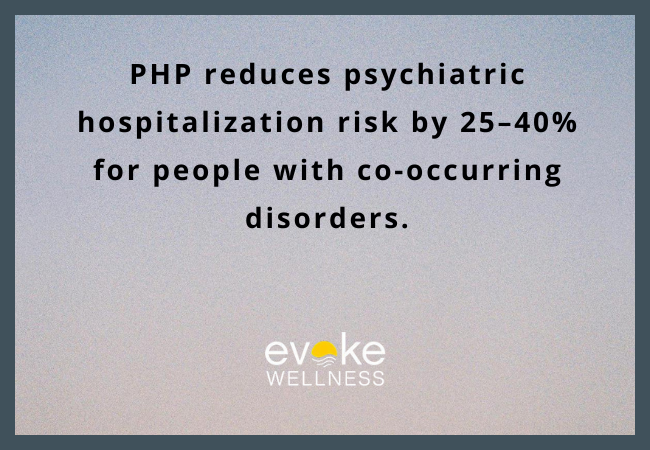Dual diagnosis—also known as co-occurring disorders—refers to the presence of both a mental health condition and a substance use disorder in the same individual. These coexisting issues often influence each other, creating a cycle that can be difficult to break without comprehensive, integrated treatment. While many people may enter rehab to address addiction or seek therapy for a mental health concern, treating only one aspect of the issue can leave the door open for relapse.
This is where Partial Hospitalization Programs (PHPs) can make a transformative impact. A PHP provides the structure and intensity of care that dual diagnosis patients often require, without the need for 24/7 inpatient hospitalization. For those struggling with complex mental health and substance abuse challenges, PHP offers a middle ground—a supportive, therapeutic environment with medical supervision, yet the flexibility to return home or to a sober living community in the evenings.
At Evoke Waltham, our approach to treating dual diagnosis in a PHP setting is rooted in evidence-based therapies, clinical expertise, and compassionate care. We understand how deeply intertwined mental illness and addiction can be, and we provide individualized treatment that addresses both issues simultaneously.
Understanding the Link Between Mental Health and Addiction
Mental health disorders and substance use frequently coexist because one can easily influence the development or severity of the other. For example, someone with undiagnosed anxiety or depression may turn to alcohol or drugs to self-medicate. Over time, this reliance can spiral into addiction. Conversely, long-term substance use can lead to chemical imbalances and behavioral changes that contribute to the onset of mental health disorders.
The risk of relapse significantly increases when only one part of the dual diagnosis is treated. Without addressing the root causes and mental health triggers behind substance use, clients may find themselves caught in the same destructive cycles. That’s why PHPs that specialize in co-occurring disorders are essential—they provide intensive, targeted care that accounts for both conditions.
What PHP Involves for Dual Diagnosis Clients
A PHP typically involves daily treatment sessions that last several hours. While each program differs, clients can generally expect to attend sessions five to six days per week. The structure helps provide a stable, safe routine for individuals working through intense emotional and behavioral challenges.
PHP at Evoke Waltham includes the following key components:
-
Individual therapy sessions with licensed mental health clinicians
-
Group therapy that promotes peer support and skill-building
-
Psychiatric care, including evaluations and medication management
-
Crisis intervention support when symptoms escalate
-
Educational workshops on mental health and substance use
-
Relapse prevention planning
-
Life skills development to support independence
This intensive level of care helps clients build a strong foundation while also preparing them for the next steps in recovery, whether that’s outpatient treatment, continued therapy, or reintegration into daily life.
The Importance of Individualized Care
No two individuals experience dual diagnosis the same way. One person may be dealing with PTSD and opioid addiction, while another may be managing bipolar disorder alongside alcohol use disorder. That’s why individualized treatment is at the core of our approach.
Every client begins PHP at Evoke Waltham with a comprehensive assessment. This includes a full psychiatric evaluation, substance use history, and discussion of life circumstances, health conditions, and personal goals. Based on this information, we create a customized treatment plan that may include a variety of therapeutic modalities such as:
-
Cognitive-behavioral therapy (CBT)
-
Dialectical behavior therapy (DBT)
-
Trauma-informed therapy
-
Motivational interviewing
-
Family therapy
-
Holistic wellness practices
These plans evolve as clients progress, ensuring they receive the appropriate level of care and intervention at each stage of recovery.
Core Therapies for Treating Co-Occurring Disorders
At the heart of PHP for dual diagnosis are therapies that have been proven to work for both mental health and substance use treatment. One such therapy is Cognitive-Behavioral Therapy (CBT). This approach helps individuals understand how their thoughts, behaviors, and emotions are interconnected. CBT encourages clients to identify distorted thinking patterns and develop healthier ways of responding to stress or cravings. CBT is widely used across Mental Health Therapy Programs in Waltham, Massachusetts and forms a key part of our PHP structure.
Another effective approach is Dialectical Behavior Therapy (DBT), particularly useful for individuals who struggle with emotional regulation, impulsivity, or suicidal ideation. DBT combines acceptance strategies with change strategies, helping clients learn mindfulness, distress tolerance, and interpersonal effectiveness. This therapeutic method is a core component of our Dual Diagnosis Treatment Program in Waltham, MA, where clients are guided through DBT modules in both individual and group formats.
Group therapy also plays a pivotal role in healing. Being able to connect with others who understand your experiences creates a sense of belonging and reduces isolation. Our groups offer a safe space to explore issues like grief, trauma, anger, and relapse triggers, with support from both peers and facilitators. This is a central feature of many Addiction Treatment Programs in Massachusetts, including our PHP model.
Medical and Psychiatric Support in PHP
Managing co-occurring disorders often requires the use of psychiatric medication to stabilize symptoms and support recovery. At Evoke Waltham, our on-site psychiatric professionals evaluate each client to determine whether medications such as antidepressants, antipsychotics, or mood stabilizers are appropriate.
We prioritize safe, responsible medication use. Clients are closely monitored for side effects, effectiveness, and interactions with other treatments. Education about each prescription is also provided so individuals can make informed decisions about their care. While medication isn’t the answer for everyone, it can provide much-needed stability when used in conjunction with psychotherapy and holistic supports.
Incorporating Holistic Approaches
While evidence-based clinical therapy forms the foundation of our PHP, we also believe in the power of holistic healing. Co-occurring disorders affect every aspect of a person’s well-being—physical, mental, emotional, and spiritual. That’s why we offer a range of complementary services such as:
-
Mindfulness and meditation
-
Yoga and physical wellness
-
Nutrition education
-
Expressive arts therapy
-
Journaling and guided reflection
These services help individuals reconnect with themselves and find healthy ways to manage stress, anxiety, and depression. They also build self-esteem and promote emotional resilience.
Support for Families and Loved Ones
Dual diagnosis doesn’t only affect the individual—it impacts families, friends, and entire support networks. Family involvement is an integral part of PHP at Evoke Waltham. Through educational workshops, counseling sessions, and family therapy, we help rebuild relationships and provide loved ones with the tools to support recovery.
Key goals of family involvement include:
-
Improving communication
-
Setting healthy boundaries
-
Learning about mental illness and addiction
-
Resolving long-standing emotional issues
With the right knowledge and support, families can become strong allies in their loved one’s healing journey.
Transitioning After PHP: What Comes Next?
As clients complete PHP, we begin developing a personalized aftercare plan that supports long-term success. Recovery is a lifelong journey, and transitioning out of a structured program requires preparation and strategy.
Our aftercare planning includes:
-
Recommendations for outpatient therapy
-
Continued psychiatric care or medication management
-
Connection to sober living homes if needed
-
Guidance on 12-step or peer support groups
-
Vocational and educational resources
Clients are never left to navigate recovery alone. We collaborate with outside providers and community partners to ensure each person receives the care and resources needed to continue making progress.
Our Partial Hospitalization Program Massachusetts serves as a bridge between acute treatment and lasting recovery, offering the consistency and depth of care necessary to truly heal from co-occurring disorders.
Why Choose Evoke Waltham?
At Evoke Waltham, we specialize in treating co-occurring disorders through evidence-based, person-centered care. Our team of licensed therapists, psychiatrists, and case managers work collaboratively to ensure every aspect of a client’s mental health and addiction treatment is addressed.
We are proud to be part of a broader network of Addiction Treatment Programs in Massachusetts and offer clients access to comprehensive care in a safe, supportive environment. Whether you’re stepping down from inpatient rehab or seeking help for the first time, our PHP is designed to meet you where you are and help you move forward.
Our focus is not only on stabilization but on empowerment—giving you the tools, insight, and support you need to live a life free from addiction and emotional distress.
Conclusion
Dual diagnosis requires specialized care, and a PHP offers the ideal setting for deep healing and structured support. With the right blend of therapies, medical care, and personal development, individuals can overcome the challenges of co-occurring disorders and build a meaningful life in recovery.
If you or someone you love is struggling with mental health and addiction, Evoke Waltham is here to help. Call 866.276.1920 to speak with our team and take the first step toward a healthier, more hopeful future.
Frequently Asked Questions (FAQs)
Why is a PHP a good option for dual diagnosis?
A Partial Hospitalization Program (PHP) provides intensive, structured care without requiring an overnight stay. This makes it ideal for dual diagnosis clients who need daily therapy, psychiatric care, and skill-building support in a flexible setting.
How long does dual diagnosis treatment in PHP last?
The length of a PHP varies depending on individual needs but typically ranges from a few weeks to several months. Treatment is adjusted based on progress, symptom severity, and recovery goals.
What therapies are used in a dual diagnosis PHP?
Common therapies include cognitive-behavioral therapy (CBT), dialectical behavior therapy (DBT), trauma-informed care, group therapy, and medication management. These are tailored to address both mental health symptoms and substance use patterns.
Is medication part of dual diagnosis treatment?
Yes, psychiatric medication is often used to stabilize mental health symptoms and support recovery. Clients receive regular evaluations and medication management as part of the program.
Will my family be involved in my treatment?
Yes. Family therapy and education are often included in dual diagnosis programs to improve communication, set healthy boundaries, and support the client’s long-term recovery.
What happens after completing a PHP for dual diagnosis?
After PHP, clients typically transition to a lower level of care such as outpatient therapy or intensive outpatient programs. A personalized aftercare plan is developed to support ongoing recovery and prevent relapse.



